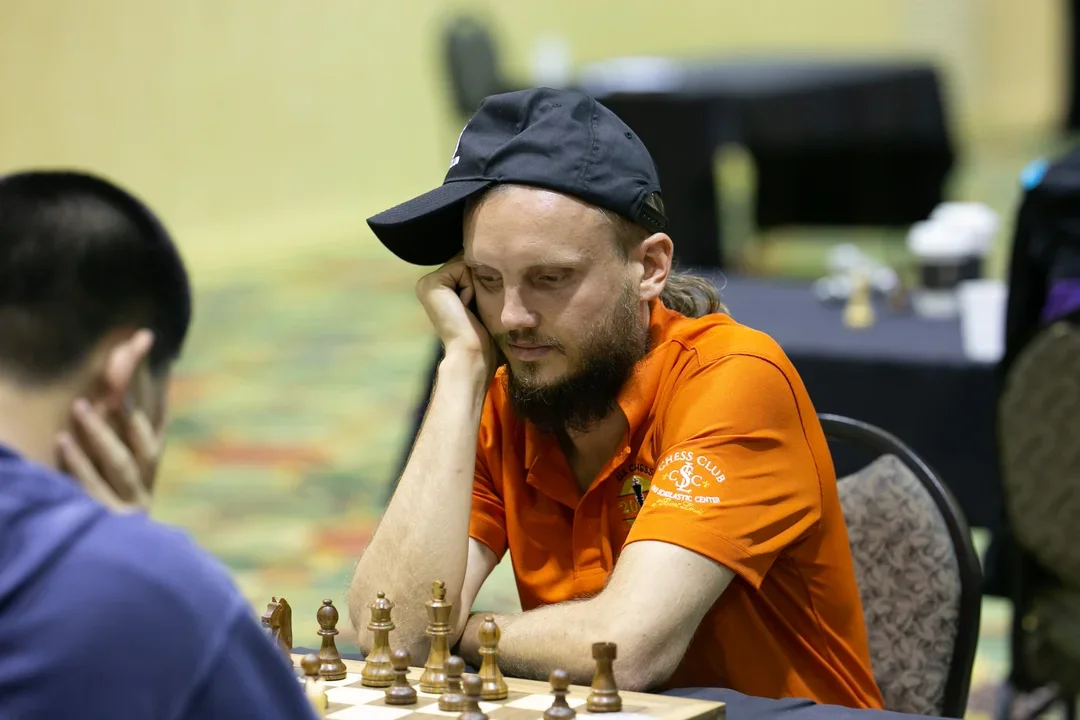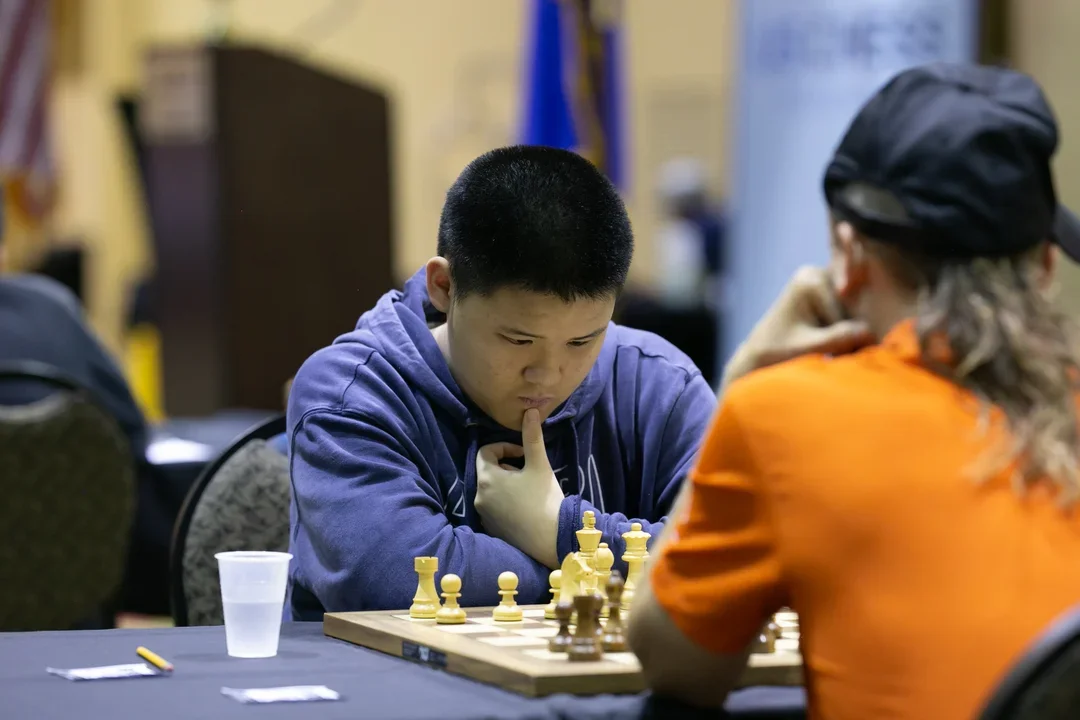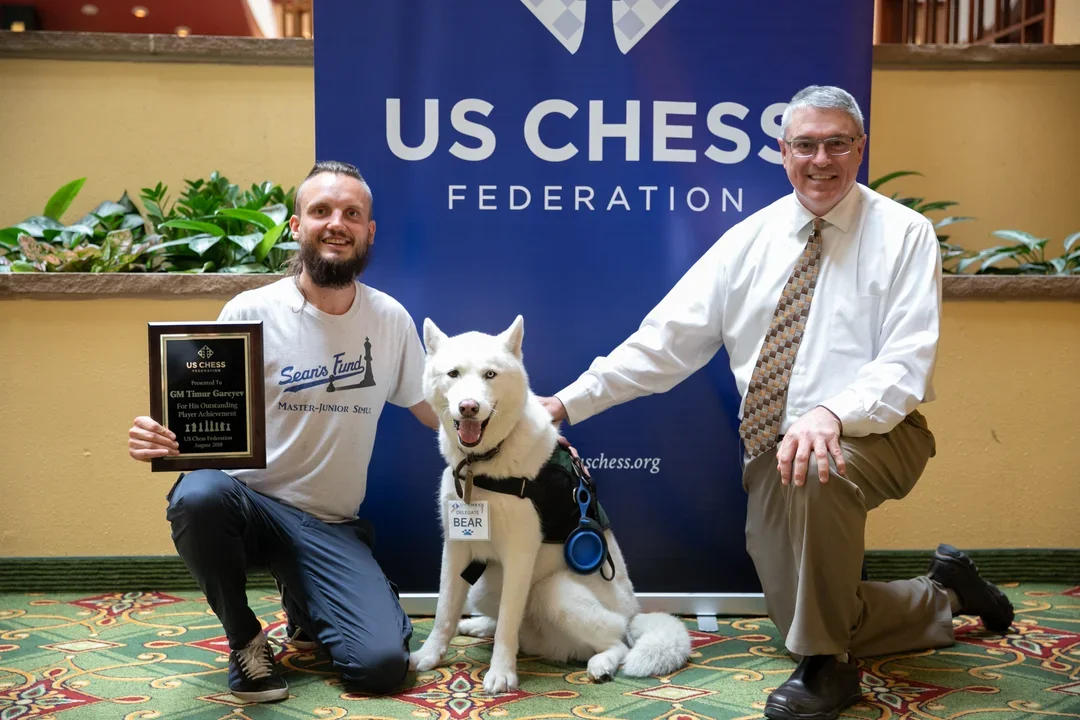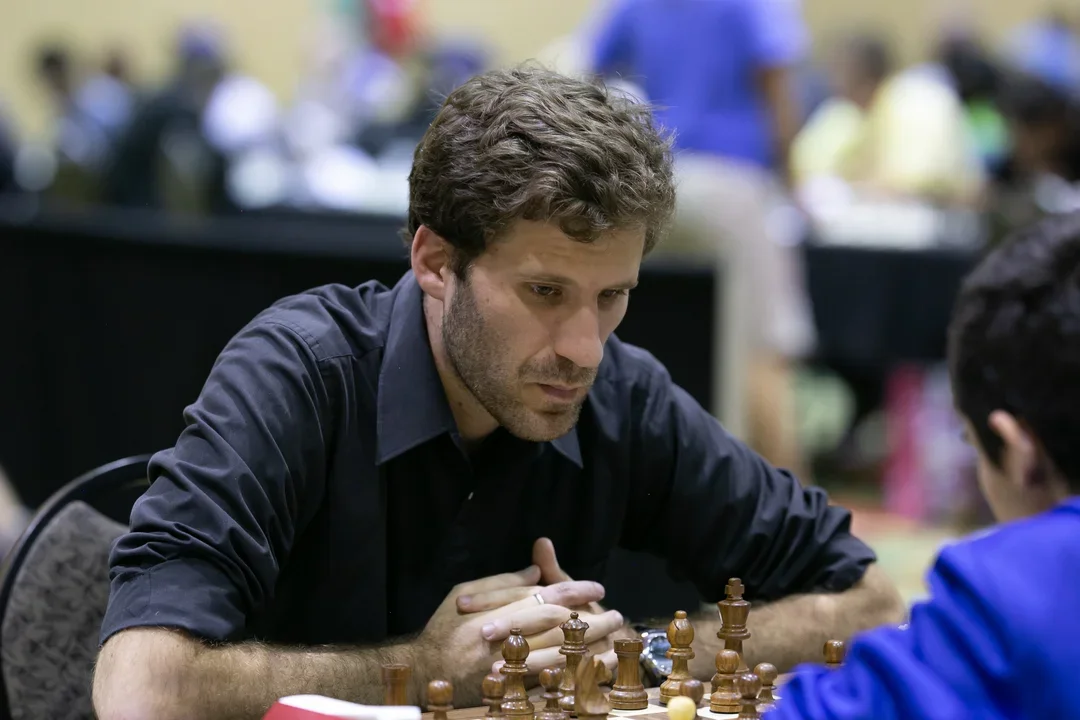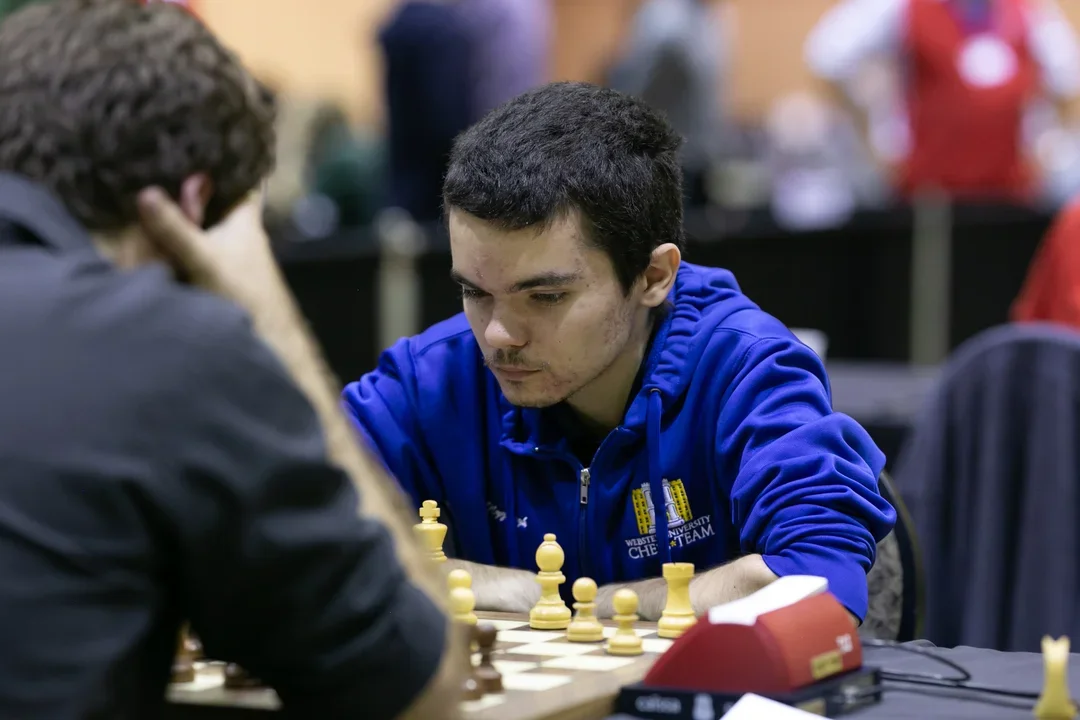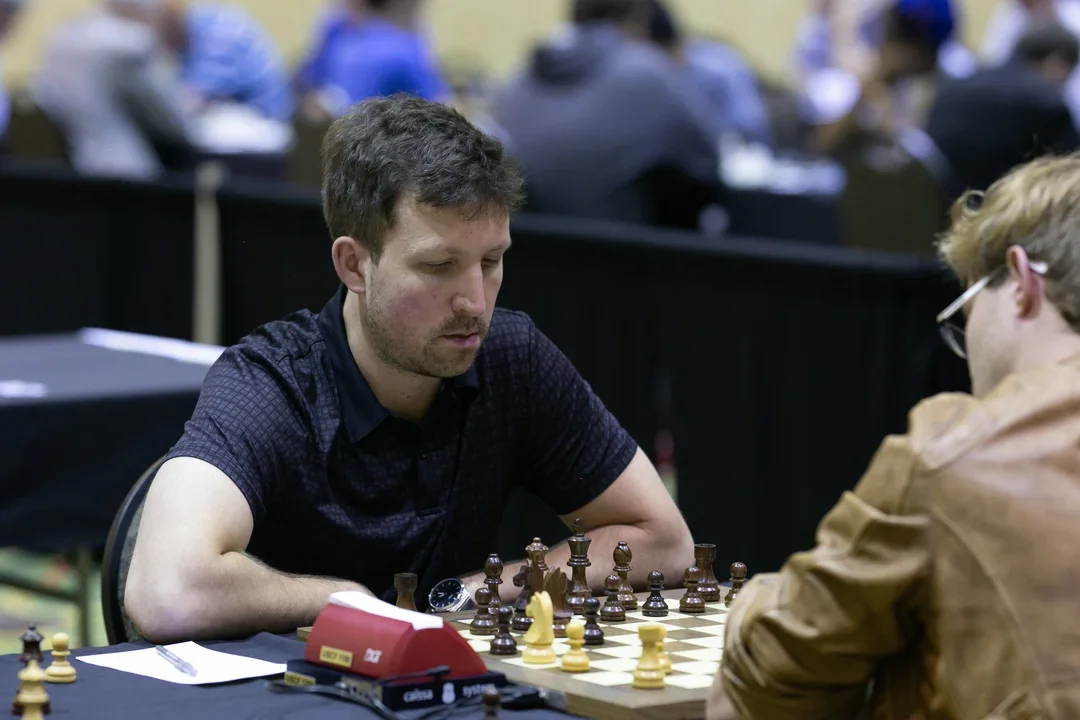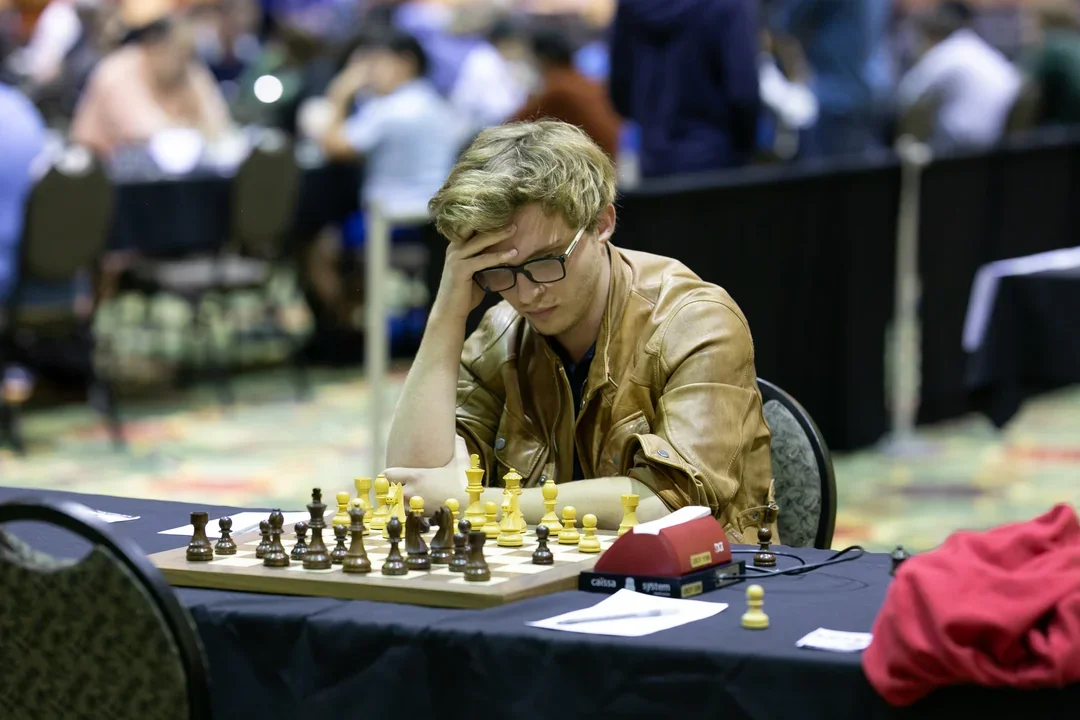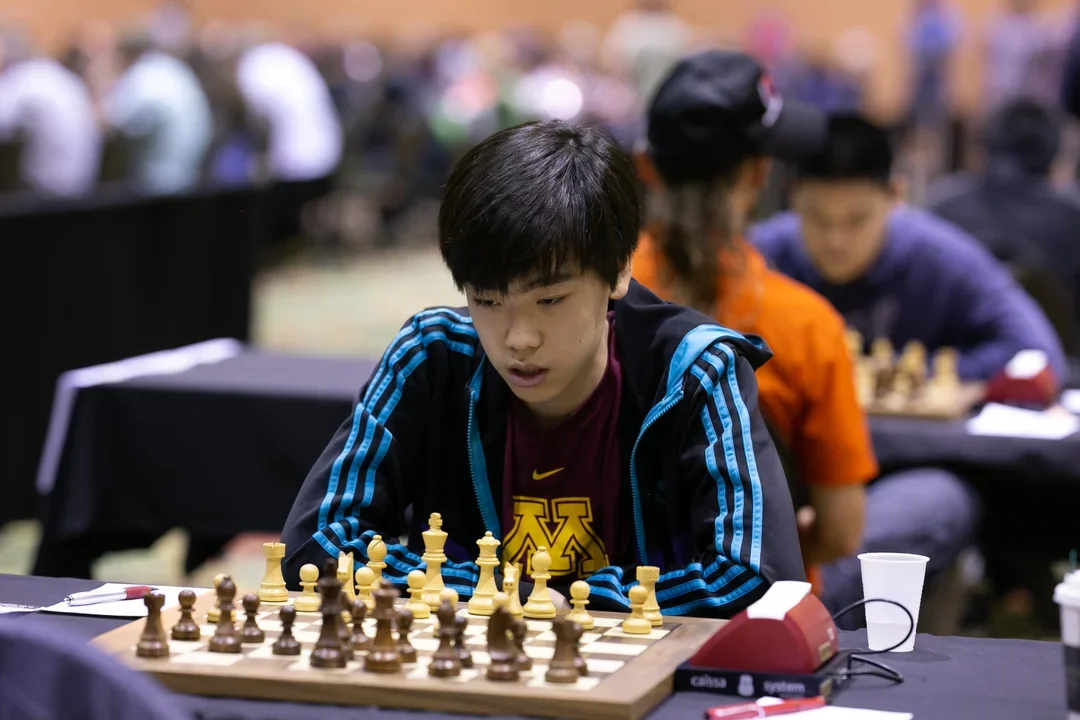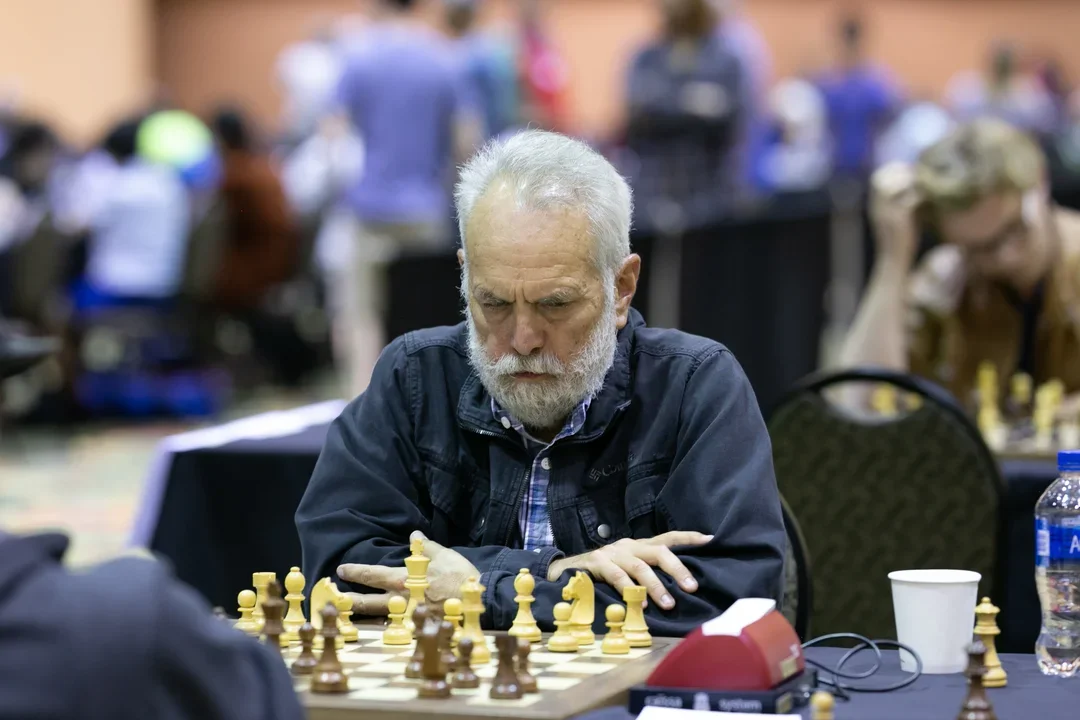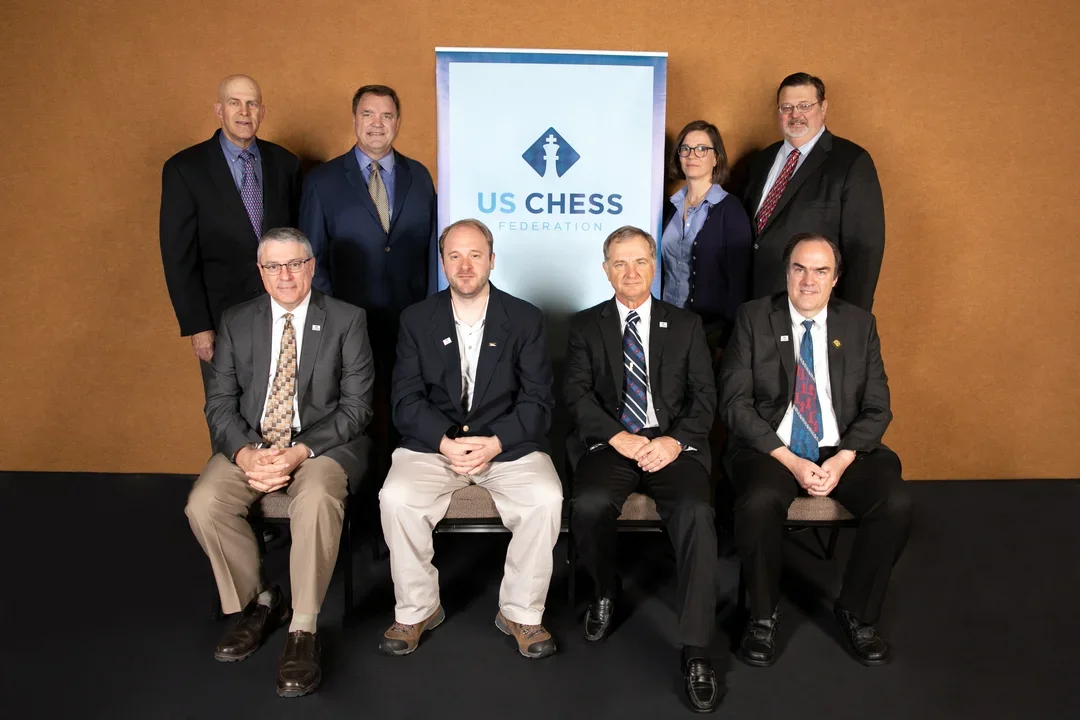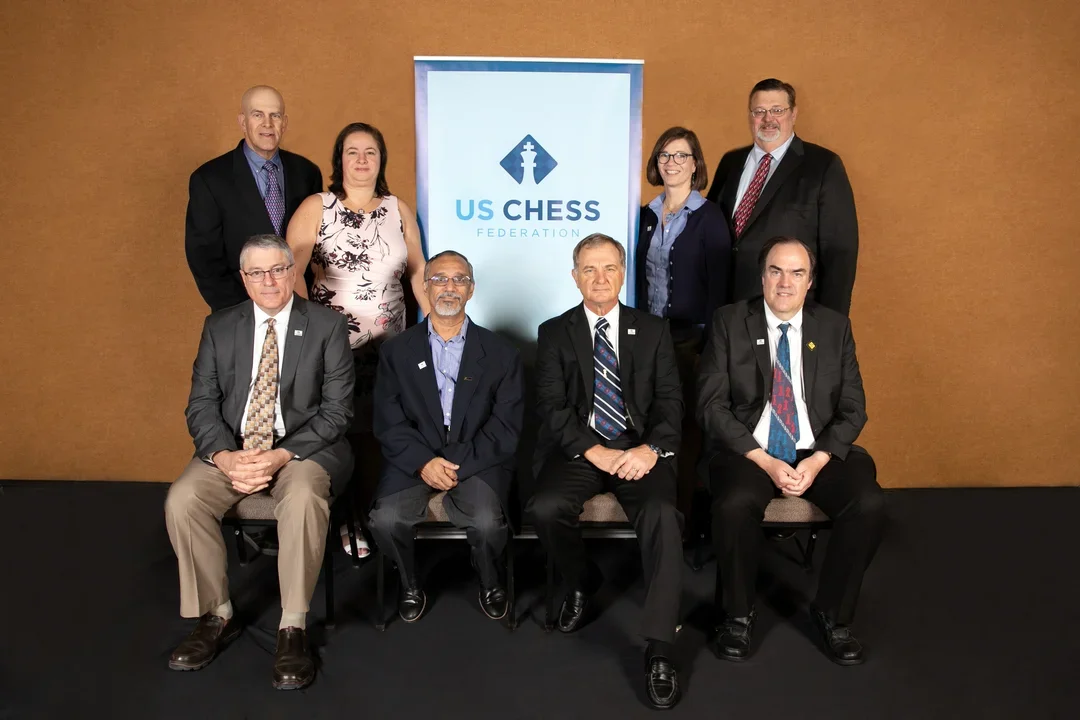Blindfold phenom Timur Gareyev (Kansas) kept his eyes very wide open to opportunities as he rebounded from a 5th-Round loss to GM Jorge Cori (Missouri). Gareyev scored eight wins to clinch clear first, a half-point ahead of five other GMs at the 2018 U.S. Open Championship. He took home an impressive trophy, a $6,600 check, and a coveted spot in the 2019 US Invitational Championship. “It’s my most significant result in the past three years,” Gareyev said.
Many know Gareyev these days for his remarkable blindfold-chess performances. He holds the official Guinness World Record for his 48-board display in Las Vegas in December 2016. But he’s no stranger to big tournament wins. In 2011, while completing his B.A. in marketing at the University of Texas-Brownsville (now UT-Rio Grande Valley), he tied for first at the 2011 U.S. Open with six others. (This year he scored a half-point better to take sole honors.) He’s also won the Chicago Open, the National Open, and the North American Open. The US Chess Trust awarded Gareyev a Samford Scholarship in 2012. Before coming to the US, he tied for first in the National Championship of Uzbekistan in 2007 and twice played on its Olympiad team.
Five GMs followed Gareyev a half-point behind at 7 ½ : GM Ruifeng Li (Texas), Illia Nyzhnyk (Missouri), Andrew Tang (Minnesota), and Alexander Fishbein and Mackenzie Molner (both of New Jersey).
Nyzhnyk was first to establish that score group with a curious knockout over GM Robert Hungaski (NY) that featured g4 and a two-piece mating attack. You can safely play this over at home—but be cautious about showing it to beginners!
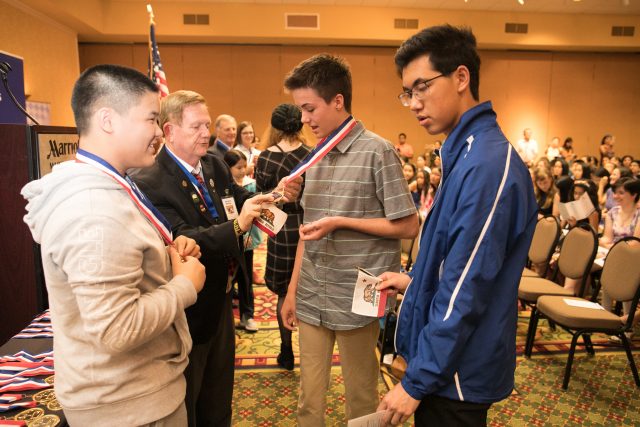 Dewain Barber and GM Awonder Liang at the Opening Ceremony of the Denker, Barber, NGTOC and NSTOC. Photo Henk Prinsloo
On the final Sunday, two Executive Board members, WGM Angelina Belakovskaia (Arizona) and Lakshmana “Vish” Viswanath (Texas), concluded their terms of service to US Chess, while Randy Bauer (Iowa) and Ryan Velez (Kentucky) began three-year terms of service. The Board elected Allen Priest (Kentucky) new president of US Chess. Executive Director Carol Meyer attended all of the events, discussing plans for the future with delegates and other members.
Organizing the U.S. Open takes a hardworking, professional team. The 119th iteration of our most historic national chess championship was, as usual, held under the auspices of US Chess. Its National Events Manager Boyd Reed and Assistant National Events Manager Pete Karagianis were meticulous in making the main event and many side tournaments, meetings and workshops inviting. Chief TD Wayne Clark (Illinois) managed a staff of 14, including Floor Chief Bill Snead (New York), and Back Room Chief Joe Yun (Ohio). Frank Johnson (Georgia) and Kelly Bloomfield (Ohio) monitored the internet broadcast of the top boards. Jon Haskel directed the four invitationals that kicked off the schedule. Executive Board Secretary Mike Nietman was everywhere pitching in, making the second US Open in five years in his home state a success.
Dewain Barber and GM Awonder Liang at the Opening Ceremony of the Denker, Barber, NGTOC and NSTOC. Photo Henk Prinsloo
On the final Sunday, two Executive Board members, WGM Angelina Belakovskaia (Arizona) and Lakshmana “Vish” Viswanath (Texas), concluded their terms of service to US Chess, while Randy Bauer (Iowa) and Ryan Velez (Kentucky) began three-year terms of service. The Board elected Allen Priest (Kentucky) new president of US Chess. Executive Director Carol Meyer attended all of the events, discussing plans for the future with delegates and other members.
Organizing the U.S. Open takes a hardworking, professional team. The 119th iteration of our most historic national chess championship was, as usual, held under the auspices of US Chess. Its National Events Manager Boyd Reed and Assistant National Events Manager Pete Karagianis were meticulous in making the main event and many side tournaments, meetings and workshops inviting. Chief TD Wayne Clark (Illinois) managed a staff of 14, including Floor Chief Bill Snead (New York), and Back Room Chief Joe Yun (Ohio). Frank Johnson (Georgia) and Kelly Bloomfield (Ohio) monitored the internet broadcast of the top boards. Jon Haskel directed the four invitationals that kicked off the schedule. Executive Board Secretary Mike Nietman was everywhere pitching in, making the second US Open in five years in his home state a success.
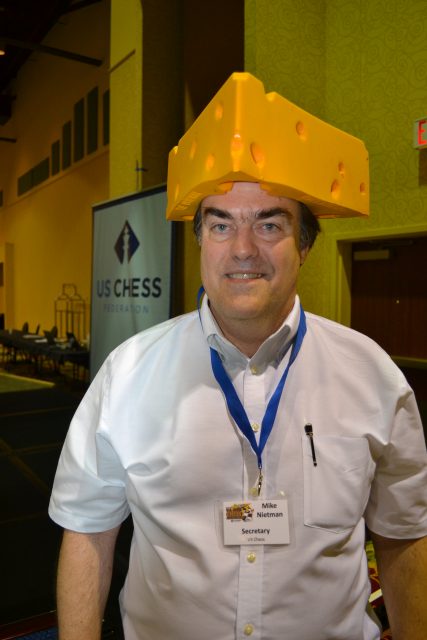 The 120th US Open Chess Championship will be contested at the Rosen Centre Hotel in Orlando, Florida, August 3-11 and offer the now usual choices of nine, six and four-day schedules. Make plans to be part of this historic anniversary. At the US Open, you’re always in the same room with some of the world’s best, you’re always a part of chess history, and you always have a shot at a substantial prize.
The 120th US Open Chess Championship will be contested at the Rosen Centre Hotel in Orlando, Florida, August 3-11 and offer the now usual choices of nine, six and four-day schedules. Make plans to be part of this historic anniversary. At the US Open, you’re always in the same room with some of the world’s best, you’re always a part of chess history, and you always have a shot at a substantial prize.
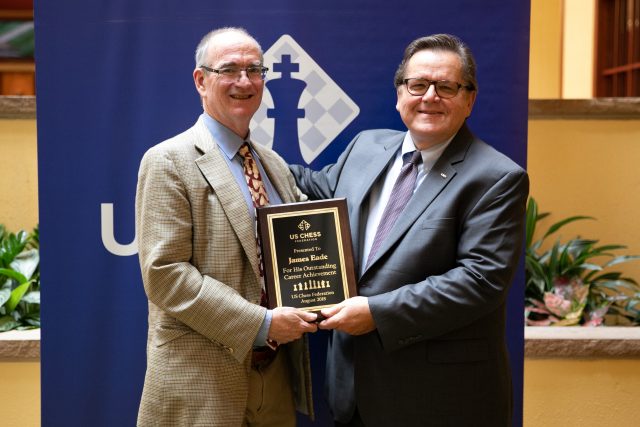 Jim Eade and author Al Lawrence, both of US Chess Trust at the US Chess Annual Awards banquet, where Eade won an award for Outstanding Career Achievement, Photo Henk Prinsloo
Find full standings and results of the U.S. Open here and find prize breakdown here.
Jim Eade and author Al Lawrence, both of US Chess Trust at the US Chess Annual Awards banquet, where Eade won an award for Outstanding Career Achievement, Photo Henk Prinsloo
Find full standings and results of the U.S. Open here and find prize breakdown here.
[pgn]
[Event "US Open"]
[Site "?"]
[Date "2018.08.05"]
[Round "?"]
[White "Nyzhnyk, Illya"]
[Black "Hungaski, Robert"]
[Result "1-0"]
[ECO "A28"]
[PlyCount "37"]
[EventDate "2018.??.??"]
1. c4 e5 2. Nc3 Nf6 3. Nf3 Nc6 4. e3 Bb4 5. Qc2 O-O 6. Nd5 Re8 7. Qf5 d6 8.
Nxf6+ gxf6 9. Qh5 d5 10. a3 Bf8 11. cxd5 Qxd5 12. d3 {A few master games have
followed this cyber-like line. The ChessBase online database leaves off here.
Hall-of-famer GM Joel Benjamin played this move to a draw against GM Helgi
Olasfsson in a blitz event in 2000.} Na5 13. Bd2 Nb3 14. Rd1 Nxd2 15. Nxd2 {
Here three moves seem to offer fairly equal prospects: ... Bg7, ... Qc6, and ..
. f5. Hungaski steps out on a more precarious path.} Qe6 16. g4 f5 {The move
that spells trouble for Black.} (16... Bg7 {still makes sense.}) 17. gxf5 Qxf5
18. Rg1+ Bg7 {But now the fianchetto is too late tactically.} (18... Kh8 {
is better, but White is still on top.} 19. Rg5 Qe6 20. d4 $1 $18 {gives
White's bishop a route to join the attack.}) 19. Qh6 {1-0 Black has to give up
his queen to stop immediate mate.} 1-0[/pgn]
After Fishbein’s 18-move draw with Li on Board 1, the final round game to watch as Sunday afternoon became evening was GM Awonder Liang v. Gareyev. Would one of them pull off a win to take sole first? The top U.S. player in the U.S. Open is seeded into next year’s US Invitational Championship, with its even greater prestige and prize fund. Liang was already guaranteed a spot based on his winning the recent U.S. Junior Championship, his second in a row. But neither player had collected a clear-first US Open title, and Gareyev was hungry to return to the Invitational, where he had tied for third in 2013.
Going into the money-round, Liang, one of this year’s US Chess Trust Samford Fellows, was undefeated, winning five games, including a victory over GM Alex Shimanov (Missouri), and drawing GM Alexander Ipatov (Missouri) in Round 5 and Li in Round 7.
The sudden death of one of the participants required the complete evacuation of the tournament hall for a 3 ½ -hour delay of all games in the ninth and final round. Read the US Chess statement posted that night here. Everyone showed respect for this necessity, as one of our own had ended life at the board. Liang-Gareyev was on Move 15 at the time all clocks stopped.
Gareyev said that after the delay, he had to “Push deeper and harder. My position was strategically dangerous. Liang played excellent chess throughout the tournament.”
[pgn]
[Event "2018 US Open"]
[Site "?"]
[Date "2018.08.05"]
[Round "9"]
[White "Liang, Awonder"]
[Black "Gareyev, Timur"]
[Result "0-1"]
[ECO "B04"]
[WhiteElo "2569"]
[BlackElo "2572"]
[PlyCount "114"]
[EventDate "2018.??.??"]
[WhiteClock "0:07:56"]
[BlackClock "0:07:32"]
1. e4 Nf6 2. e5 Nd5 3. d4 d6 4. Nf3 g6 5. exd6 cxd6 6. c4 Nb6 7. Be2 Bg7 8. h3
O-O 9. O-O Bf5 10. Nc3 Nc6 11. Be3 d5 12. c5 Nc4 13. Bc1 b6 14. cxb6 axb6 {
At about 4:30 p.m., in this complicated but roughly equal position, the
players, like all of the 2018 US Open competitors, were forced to take a 3 1/
2-hour break.} 15. Qb3 e6 16. Bxc4 Na5 17. Qd1 Nxc4 18. Qe2 h5 19. Bg5 f6 20.
Bf4 g5 21. Bh2 Qd7 22. b3 Na3 23. Rfc1 b5 24. Ne1 e5 25. Qd2 Rfc8 26. dxe5 d4
27. Nd1 fxe5 28. Qxg5 Qe6 29. Nf3 Nc2 30. Bxe5 Qg6 {Forced.} 31. Qxg6 Bxg6 32.
Bxg7 Kxg7 33. Rab1 (33. Rxc2 {may have been the best choice:} Rxc2 (33... Bxc2
34. Nxd4 Bxd1 35. Rxd1 Rxa2 36. Nxb5 Rcc2 37. Rf1) 34. Nxd4 Rcxa2 35. Rxa2 Rxa2
36. Nc3) 33... Rxa2 34. Rb2 Raa8 ({After} 34... Rxb2 35. Nxb2 Rc3 36. Nxd4 Nxd4
{loses to} 37. Rxc3 Ne2+) 35. Ne5 Bh7 36. f4 d3 37. Nf2 d2 38. Rd1 Ne3 39.
Rbxd2 (39. Rdxd2 {runs into} Ra1+ 40. Nd1 (40. Kh2 $4 Nf1+ 41. Kh1 Nxd2+) 40...
Bc2) 39... Nxd1 40. Rxd1 Rd8 41. Rc1 Rac8 42. Ra1 Ra8 43. Rc1 Rac8 44. Ra1 Rd2
{The two-time and current Junior Champ now took a long think, realizing he was
in trouble, despite his extra pawns as compensation for the Exchange.} 45. g4 (
45. Ra7+ Kg8 46. Nd7 Kh8 47. Nf6 Bg6) 45... Rcc2 46. Rf1 Re2 47. gxh5 Rb2 48.
h6+ Kxh6 49. Nfg4+ Kg7 50. f5 Kf8 51. Nd3 Rxb3 52. Nf4 Reb2 53. Ne6+ Ke8 54.
Ng5 Bg8 55. Re1+ Kf8 56. Re5 Rg3+ 57. Kh1 Rd3 {0-1. If 58. Ne3 to prevent mate
on d1, then ... Re2. With this hard-fought win, Gareyev clinched the title,
the top cash, and a spot in the 2019 US Championship--where the opponents will
have another chance to slug it out.} 0-1[/pgn]
GM Belous (Texas) v. Molner was another of the round’s longest struggles, boiling down to a complex ending with each side having queen, rook and four pawns. The game was equal right up until Belous’ 53rd, when his midnight slip overlooked the strength of Molner’s definitive 53. … Ra3.
Despite the late hour after the suspension of play, Molner was wide-awake to the rook maneuver and follow-up tactic that lifted him into the 7 ½ score group. In the hallway among a throng of sleepy but dedicated fans, I gave the always modest “Mack” a thumbs-up and said, “Great game!” His expression demurred my overdone compliment. I corrected myself: “Great result!” Mac smiled and accepted that version.
[pgn]
[Event "?"]
[Site "?"]
[Date "2018.08.05"]
[White "Belous, Vladimir"]
[Black "Molner, Mackenzie"]
[Result "0-1"]
[ECO "A34"]
[WhiteElo "2558"]
[BlackElo "2465"]
[PlyCount "123"]
[EventDate "2018.??.??"]
[WhiteClock "0:58:14"]
[BlackClock "0:09:17"]
1. c4 c5 2. Nf3 Nf6 3. Nc3 d5 4. cxd5 Nxd5 5. g3 Nc6 6. Bg2 Nc7 7. a3 a5 8. Na4
e6 9. d3 Rb8 10. Qc2 b6 11. O-O Bd6 12. d4 Nxd4 13. Nxd4 cxd4 14. e3 O-O 15.
Rd1 Ba6 16. Rxd4 Qe7 17. Nc3 Be5 18. Rd1 Rfd8 19. Bd2 Bd3 20. Qb3 b5 21. Be1 a4
22. Qa2 Bc4 23. Qb1 f5 24. Qc2 Bb3 25. Rxd8+ Rxd8 26. Qe2 Bc4 27. Qc2 Bd3 28.
Qd2 Bc4 29. Qc2 Bd3 30. Qd2 Bc4 31. Qc1 Na6 32. Nxa4 Qc7 33. Nc3 Nc5 34. Qc2
Bd3 35. Qd1 Bc4 36. Qh5 Nd3 37. Rb1 Nxe1 38. Rxe1 g6 39. Qf3 Rd2 40. a4 Bxc3
41. bxc3 Bd5 42. e4 fxe4 43. Qe3 Rd3 44. Qe2 bxa4 45. Bxe4 Bxe4 46. Qxe4 Qd7
47. c4 a3 48. Kg2 Rd4 49. Qa8+ Kg7 50. Rc1 h5 51. Rc3 Kh7 52. h4 e5 53. c5 (53.
Qxa3 Rxc4 54. Rxc4 Qd5+) 53... Ra4 54. Qf3 a2 55. c6 Qc7 56. Rd3 e4 57. Rd7+
Qxd7 58. Qb3 (58. cxd7) 58... Qd4 {0-1} 59. c7 Ra8 60. c8=Q Rxc8 61. Qxa2 Rf8
62. Qe2 0-1[/pgn]
FIDE awarded 18-year-old Andrew Tang his GM title earlier this year. Tang went into the last round of the US Open undefeated but with three draws, one of them against GM James “Comeback” Tarjan (Oregon), who played on five straight Olympiad teams in the 1970s and a number of US Invitational Championships. Tarjan gave up chess to be a professional librarian in 1984. After retiring, he returned to chess at the 2014 U.S. Open at a consistently remarkable strength, despite his long absence from the game, finishing just a half-point out of first. This year he finished in a tie for 7th-13th, with 7 points. His only loss was to Ipatov in Round 6.
But Tang quickly declared all-out, on-board war against Ipatov in their final round contest, handing the 2012 World Junior Champ and former Turkish champion his only loss.
[pgn]
[Event "?"]
[Site "?"]
[Date "2018.08.06"]
[White "Tang, Andrew"]
[Black "Ipatov, Alexander"]
[Result "1-0"]
[ECO "A40"]
[WhiteElo "2507"]
[BlackElo "2650"]
[PlyCount "57"]
[EventDate "2018.??.??"]
[WhiteClock "0:03:59"]
[BlackClock "0:05:16"]
1. d4 g6 2. c4 Bg7 3. Nc3 e6 4. Nf3 Ne7 5. h4 {Tang, a half point behind the
leaders at the start of the 9th and final round, goes to battle stations on
Move 5..} h6 6. Bf4 d6 7. Qd2 Nd7 8. O-O-O Nc6 9. e4 e5 10. dxe5 Ndxe5 11. c5
Bg4 (11... Be6) 12. Qe3 h5 13. Nxe5 Nxe5 14. Bb5+ c6 (14... Kf8) 15. Rxd6 Qa5
16. Qd4 f6 17. Ba4 O-O 18. f3 Bc8 19. Rd1 Kh7 20. Bb3 Qc7 21. Qf2 Qe7 22. Kb1
Re8 23. Qg3 Nf7 24. R6d2 f5 (24... Ne5 {appears to make a breakthrough harder
for White, but Black is still worse.}) 25. Rd6 $1 Nxd6 {Opens the diagonal for
Black's bishop but weakens the critical e-5 square.} 26. Rxd6 {Unfortunately
for Black, White's d6-rook has a clone.} Bf6 27. e5 {White's b3-bishop is the
long-range trebuchet and his e5-pawn is the battering ram. The invading hordes
are soon over the moat and crashing through the gate.} Rf8 28. exf6 Rxf6 29.
Qg5 {A mercifully accurate coup de grace.} 1-0[/pgn]
Lots of other winners
The 119th US Open awarded 76 cash awards in the main event, totaling nearly $42,000. Four tied for top master with 6 ½ points: Josh Bloomer (Colorado), Andrew Titus (Minnesota), , Mark Robledo (Illinois), Isaac Martinez (Arizona) and Joshua Grabinsky (Oregon). Five tied for top Expert with 6 ½ : Jack Curcio (Illinois), Josiah Stein (Wisconsin), Vikram Srivastava (Ohio), John Miller (Ohio) and Tony Davis (Arizona). John Ritz (Wisconsin), Jason Luchan (New York), Jake Wang (Connecticut), Saif Shawkat (Kentucky), Nathan Chen (Iowa) and Allen Stern (Pennsylvania) each scored 6 to tie for top-A. A dozen players shared the B-prize with 5 points . David Roshu (Oregon) topped Class C with 4 ½. Notable among the class winners was Ryan Wandsnider (Wisconsin), who won Class E and Below with 4 ½ and GM Arnold Denker’s grandson Dylan Denker (Florida), who was best Unrated. Complete results are available online here.
Lots of side events
GM Belous, GM Andrey Stukopin (Texas), and Jimenez Corrales (Missouri) tied for first place among 96 players in the 2018 US Open Blitz Championship. Bob Holliman (Missouri) won the annual Weekend Swiss, topping a field of 50. Daniel Brashaw and Gokul Thangavel, both of Iowa, won the Bughouse championship. Daily quads were run each weekend, with more than 100 participating.
At the start of each round, NM Hal Terrie (New Hampshire) honors those with long attendance at the US Open. This year, James Mennella (California) marked his 40th US Open. His 40 uninterrupted years in a row is a record.
Meetings and workshops
US Chess hosts dozens of informative workshops during the U.S. Open Championship—on scholastic chess, women’s chess, college chess, FIDE matters, rules, ratings, publications, Chess Journalists of America, and many other topics. During the final weekend, before game times, delegates from all over the US met to discuss and vote on legislative matters. This year the delegates unanimously voted a special new designation, Dean of Scholastic Chess, to Dewain Barber, for his lifelong and generous support of youngsters in chess.
 Dewain Barber and GM Awonder Liang at the Opening Ceremony of the Denker, Barber, NGTOC and NSTOC. Photo Henk Prinsloo
Dewain Barber and GM Awonder Liang at the Opening Ceremony of the Denker, Barber, NGTOC and NSTOC. Photo Henk Prinsloo  The 120th US Open Chess Championship will be contested at the Rosen Centre Hotel in Orlando, Florida, August 3-11 and offer the now usual choices of nine, six and four-day schedules. Make plans to be part of this historic anniversary. At the US Open, you’re always in the same room with some of the world’s best, you’re always a part of chess history, and you always have a shot at a substantial prize.
The 120th US Open Chess Championship will be contested at the Rosen Centre Hotel in Orlando, Florida, August 3-11 and offer the now usual choices of nine, six and four-day schedules. Make plans to be part of this historic anniversary. At the US Open, you’re always in the same room with some of the world’s best, you’re always a part of chess history, and you always have a shot at a substantial prize.
 Jim Eade and author Al Lawrence, both of US Chess Trust at the US Chess Annual Awards banquet, where Eade won an award for Outstanding Career Achievement, Photo Henk Prinsloo
Jim Eade and author Al Lawrence, both of US Chess Trust at the US Chess Annual Awards banquet, where Eade won an award for Outstanding Career Achievement, Photo Henk PrinslooCategories
Archives
- January 2026 (2)
- December 2025 (27)
- November 2025 (29)
- October 2025 (39)
- September 2025 (27)
- August 2025 (29)
- July 2025 (43)
- June 2025 (25)
- May 2025 (24)
- April 2025 (29)
- March 2025 (29)
- February 2025 (20)
- January 2025 (24)
- December 2024 (34)
- November 2024 (18)
- October 2024 (35)
- September 2024 (23)
- August 2024 (27)
- July 2024 (44)
- June 2024 (27)
- May 2024 (31)
- April 2024 (51)
- March 2024 (34)
- February 2024 (25)
- January 2024 (26)
- December 2023 (29)
- November 2023 (26)
- October 2023 (37)
- September 2023 (27)
- August 2023 (37)
- July 2023 (47)
- June 2023 (33)
- May 2023 (37)
- April 2023 (45)
- March 2023 (37)
- February 2023 (28)
- January 2023 (31)
- December 2022 (23)
- November 2022 (32)
- October 2022 (31)
- September 2022 (19)
- August 2022 (39)
- July 2022 (32)
- June 2022 (35)
- May 2022 (21)
- April 2022 (31)
- March 2022 (33)
- February 2022 (21)
- January 2022 (27)
- December 2021 (36)
- November 2021 (34)
- October 2021 (25)
- September 2021 (25)
- August 2021 (41)
- July 2021 (36)
- June 2021 (29)
- May 2021 (29)
- April 2021 (31)
- March 2021 (33)
- February 2021 (28)
- January 2021 (29)
- December 2020 (38)
- November 2020 (40)
- October 2020 (41)
- September 2020 (35)
- August 2020 (38)
- July 2020 (36)
- June 2020 (46)
- May 2020 (42)
- April 2020 (37)
- March 2020 (60)
- February 2020 (38)
- January 2020 (45)
- December 2019 (34)
- November 2019 (35)
- October 2019 (42)
- September 2019 (45)
- August 2019 (56)
- July 2019 (44)
- June 2019 (35)
- May 2019 (40)
- April 2019 (48)
- March 2019 (61)
- February 2019 (39)
- January 2019 (30)
- December 2018 (29)
- November 2018 (51)
- October 2018 (45)
- September 2018 (29)
- August 2018 (49)
- July 2018 (35)
- June 2018 (31)
- May 2018 (39)
- April 2018 (31)
- March 2018 (26)
- February 2018 (33)
- January 2018 (30)
- December 2017 (26)
- November 2017 (24)
- October 2017 (30)
- September 2017 (30)
- August 2017 (31)
- July 2017 (28)
- June 2017 (32)
- May 2017 (26)
- April 2017 (37)
- March 2017 (28)
- February 2017 (30)
- January 2017 (27)
- December 2016 (29)
- November 2016 (24)
- October 2016 (32)
- September 2016 (31)
- August 2016 (27)
- July 2016 (24)
- June 2016 (26)
- May 2016 (19)
- April 2016 (30)
- March 2016 (36)
- February 2016 (28)
- January 2016 (32)
- December 2015 (26)
- November 2015 (23)
- October 2015 (16)
- September 2015 (28)
- August 2015 (28)
- July 2015 (6)
- June 2015 (1)
- May 2015 (2)
- April 2015 (1)
- February 2015 (3)
- January 2015 (1)
- December 2014 (1)
- July 2010 (1)
- October 1991 (1)
- August 1989 (1)
- January 1988 (1)
- December 1983 (1)


